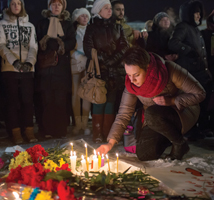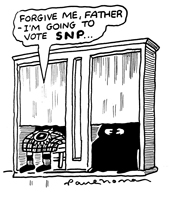There has traditionally been strong support among Catholics for Labour but the party is in danger of neglecting this important constituency. Remarks critical of nuns as teachers by Labour’s education spokesman could be a sign of the times
Tristram Hunt must have been taken aback by the strength of the negative reaction to his off-the-cuff comments about convent schooling on BBC1’s Question Time last week. Before the days of the internet, the Shadow Education Secretary’s comments would have drawn a handful of angry letters. Today, we had #nungate – hundreds of angry tweets, many from people who themselves have benefited from being taught by nuns and a few hundred more taking a more jocular line.
Hunt is not anti-Catholic and is far from being theologically ignorant, and in normal times the story might have died quickly. The reason it drew such a strong reaction is because it speaks to a concern that Labour is becoming more hostile to Catholics and Catholics are returning the compliment by taking their votes elsewhere.
It is a serious issue for Labour. Harold Wilson once said that the Labour Party owed more to Methodism than to Marx. Had alliteration allowed, he could well have said the same about Catholicism. From Cardinal Manning’s intervention in the 1889 London docks strike, the histories of the Catholic Church and the labour movement are heavily intertwined so wherever Catholicism flourished in the big cities and regions such as the north-west of England, Catholic socialists and trade unionists were involved in growing the Labour and trade-union movements.
Study any map of the distribution of population by religion, and there is a strong correlation between Catholic density and Labour representation. Catholics voted for Labour candidates in their millions in the elections following the party’s formation in 1900.
This has remained true in recent elections. In the latest research, 45 per cent of Catholics say they would vote Labour in the upcoming election against 29 per cent for the Conservatives, although a worryingly large 13 per cent say they will vote Ukip – the United Kingdom Independence Party (2015 British election study).
Bob Worcester of Ipsos Mori said of the 2010 election that if Catholics had been the only voters, Gordon Brown would have won by a landslide. Forty-three per cent of Catholics voted Labour against 30 per cent for the Conservatives. But these are low points compared with the 1997 and 2001 elections, when some 60 per cent of Catholics voted to give Tony Blair his landslides.
Theologically, there is much to draw Catholics to left-of-centre parties because of Catholic Social Teaching. In the old Catechism, injustice to the wage earner was one of four sins crying out to heaven for vengeance. Leo XIII’s encyclical Rerum Novarum set out a moderate but strongly pro-worker and capitalism-sceptic teaching for the Church.
But too much can be made of the theology. Historically, Catholics in Britain have voted Labour primarily because of class rather than religion. And in some parts of the country, nationalism and suspicion of Protestant politics in Scotland and Liverpool strengthened their political allegiance to Labour.
Just as demographics explain the rise of the Labour Catholic vote, so too do they explain its decline. The Church in the Hull of my childhood was predominantly a working-class religion. Churches and schools were on the council estates. People went to church, became members of the union and voted Labour. As working-class numbers have declined, the Church, like the rest of society, has inevitably become more middle class. The ties that bound generations of Catholic voters to Labour have weakened.
In Scotland, the situation is starker. For a century, Scottish working-class Catholic voters were overwhelmingly Labour. Their working-class allegiance to Labour was strengthened by suspicion of a Protestant Conservative and Unionist Party.
The Scottish National Party (SNP) was for decades also seen as a Protestant party. But for the past 20 years, the SNP has worked hard to woo Catholic voters. The recent referendum on Scottish independence marked the culmination of the success of the strategy. The SNP labelling the Yes campaign as unionists was a clever tactic designed to underpin its appeal to Catholic voters. According to polling by Lord Ashcroft, Catholics voted yes to independence by 57 per cent to 43 per cent, an extraordinary change of circumstances.
There has been much soul-searching by Labour in Scotland as to why they have seemingly lost such a large proportion of the Catholic vote almost overnight. Some blame an increasingly SNP-friendly hierarchy. One Labour MP described the bishops’ conference in Scotland as the ecclesiastical wing of the SNP. This may be an exaggeration but it is certainly the case that Cardinal Keith O’Brien, Archbishop of St Andrews and Edinburgh from 1985 until 2013, and Archbishop Philip Tartaglia of Glasgow have strongly identified with the nationalists.
But the influence of the hierarchy is exaggerated. The real problem is that many Catholic voters feel that Labour has over decades taken their votes for granted. The new Scottish Labour leader, Jim Murphy, himself a Catholic, has his work cut out to turn the tide.
One of the reasons given by Labour’s episcopal critics for this disillusionment was the focus of the Blair government on issues such as gay rights. Conservative commentators in the Church have suggested that this increasingly secular agenda is leading to disenchantment among Catholic voters. This is almost certainly overplayed. The attitudes of Catholic voters to issues such as same-sex marriage do not vary significantly from those of voters in the whole of the population.
But what the Hunt incident may betray is a growing gap between politicians of all parties and voters who have strong faith allegiances. A good example is the debate about kosher and halal meat. Another is the lack of understanding by politicians of the purpose, history and function of Catholic and Jewish schools.
The lack of sensitivity to issues of faith and conscience can of course work both ways. While there was a degree of intolerance shown by some in the Labour Party to MPs who for reasons of conscience decided to vote against same-sex marriage, there were equally disgraceful examples of intolerance shown to some Catholic Labour MPs who voted in conscience for same-sex marriage by local clergy, including some denounced from the pulpit at Sunday Mass.
Secularism is not new – I encountered plenty of party members in the 1970s who did not like the fact that Hull was run by Catholics and Jews – but it is better organised. A cursory glance at the website of the Office of the Schools Adjudicator shows that almost all of the complaints about admissions policies have been made by the Fair Admissions Campaign, supported by the British Humanist Association, among others, against Catholic and Jewish schools.
The future relationship between Catholics and Labour is not all doom and gloom. There are around 50 Catholic Labour MPs, just less than a fifth of the Parliamentary Labour Party. And at local level, the activities of many Catholics in Cafod, Caritas and in the living-wage movement, bring Catholics and Labour activists together on day-to-day issues.
Tristram Hunt’s comments will soon be forgotten. But the bonds that have traditionally connected a majority of Catholic voters to the Labour Party are likely to become increasingly frayed.
The more aggressive “humanist” agenda in the Labour Party is already leading to demands for limits on faith-based admissions in Catholic schools. Those with long memories will recall that this was attempted in 2006 during Tony Blair’s premiership. Labour could help allay fears by strongly indicating its support for Catholic education.
Mike Craven is a former Labour adviser.





 Loading ...
Loading ...
What do you think?
You can post as a subscriber user...
User Comments (3)
'Theologically, there is much to draw Catholics to left-of-centre parties because of Catholic Social Teaching.' Other opinions are available!
http://www.amazon.co.uk/Catholic-Social-Teaching-Market-Economy/dp/0255365810
https://www.youtube.com/watch?v=U40oNZpaBps
Why is a Catholic vote for UKIP 'worrying'? What is so infuriating about left of centre parties is that they believe they have the better ethics, the stronger concern for the common man, the monopoly on 'correct' answers. It is exactly that which turns me off completely. What is more, the negative campaigning and 'bogeymanning' of politics undermines the core respect that democracy needs to thrive. Where parties clearly work against the dignity of man, we should say so, but to work on an assumption that this is a party's essence is, dare I say, intolerant.
I don't give two hoots about "nun gate" which only serves to show just how middle class the Church has become in this country. Of far more interest is the fact that it has taken the Tablet until now to wake up to the fact that Labour has long had a sneering contempt for the unwashed religious. Angela Eagle taking it as a badge of honour that her views are diametrically opposed to Catholicism. Harriet Harman barely able to conceal her distaste for Pope Benedict, but please let's not fool ourselves, Labour has long ago moved on from any concern for the "Catholic vote" if any such thing exists. It is very telling that it has taken the concerns of wealthy ex-convent schoolgirls to bring this lack of concern to the attention of this magazine.